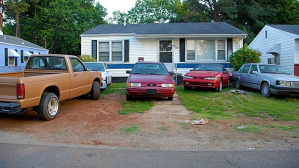Also discussed here: Automobile Poverty - Part 2 (Steve Mouzon, The Original Green, Mar. 1, 2011)

Today we review an interesting post that looks at the economics for low income people who chose to live in the suburbs and as a result depend on cars for transportation with an overhead cost of at least $7,000 a car per year. Add to this the end of cheap oil (a.k.a “Peak Oil”) and the huge increase in demand for cars and gas from the developing world, especially China and India, then you have a recipe for increasing poverty. Several comments on the blog pointed out the usefulness and thrift made possible in car sharing as well as advocating more use of public transit, cycling and walking where feasible – unfortunately these are often not available in suburbs and rural areas.
Key Quotes:
“The average cost of owning and maintaining a car (payments or lease, insurance, taxes, repairs, washing, oil, gas, parking, etc.) varies between $7,000 and $10,000 per year”
“If you live in sprawl, you are not economically viable without a car because you must drive everywhere..a family of four with everyone 16 or above most likely has 4 cars….4 x $7,000 = $28,000 per year for your cars..converting that $28,000 per year to home mortgage payments would buy you a house worth at least $350,000..a family of four which owns a $150,000 house in sprawl ..could afford a $500,000 house in a highly walkable place”
“The real value to living near work, in a walkable city, close to all amenities is the time you save everyday which can be put to use increasing your health, happiness and quality of life”
“If China and India do 2-1/2 times as well in their need for cars as the US, then there will be over a billion cars on the road in a few years.. Even if the supply does remain steady and Peak Oil doesn’t kick in, we’ll have a billion cars competing with our 300 million cars”
“what happens when the price of gas spikes to $20/gallon and you can’t afford to drive to all these places?..Who can afford that least? Those on the brink of poverty, of course…, if you’re poor, you’re less likely to be able to afford better food. Instead, you load up on the cheap calories of processed carbs, which increase obesity
Related articles
- How Rising Gas Prices Will Affect Your Wallet Longterm (walletpop.com)
- Car-Dependent Suburbs May Be Slums of The Future, Says Urban Planning Report (treehugger.com)
- Car-Dependent Suburbs May Be Slums of The Future, Says Urban Planning Report (treehugger.com)
- Record gas prices blamed on peak oil (cbc.ca)
- Fuel poverty and social inequality should be the focus - not fuel cost (leftfootforward.org)
- Peak Oil - Fact, Fiction or What? (politics.ie)
- The return of peak oil (macleans.ca)
- "Peak Oil Prices?" and related posts (legalplanet.wordpress.com)

No comments:
Post a Comment